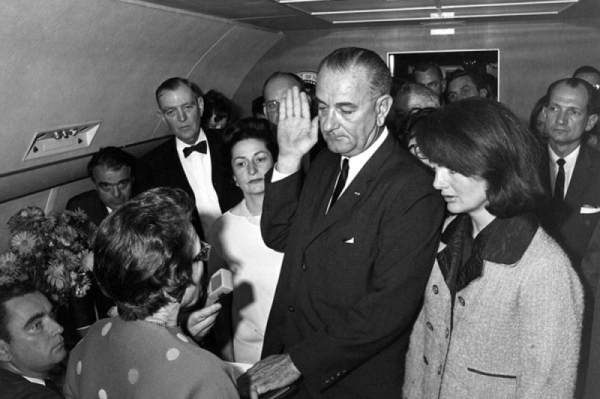How would JFK, Lyndon Johnson see U.S. politics today?

Judge Sarah T. Hughes administers the Presidential Oath of Office to Lyndon Baines Johnson aboard Air Force One, after President John F. Kennedy was assassinated, at Love Field in Dallas on November 22, 1963. File photo by Cecil Stoughton/John F. Kennedy Presidential Library & Museum | License Photo
How about this thought experiment for 2024? Suspend for a moment the inherent limitations in transposing the past into the present. After all, how much has the world changed over even the past six, let alone 60 years? One superpower collapsed; another has risen.
Consider U.S. politics. One likely presidential candidate, age 78, has been indicted on 91 charges. The other is 81 with a son who is in serious legal jeopardy. Advertisement
The parties are no longer in charge. A person of color was elected president; another, a woman, is vice president. Seniority in Congress has been trumped by a member’s presence on social media, a technology that did not exist 20 years ago. The size of the national debt soared to $34 trillion. And a handful of terrorists were able to obliterate New York City’s massive Twin Towers in 2001. Advertisement
Suppose John F. Kennedy and Lyndon Johnson miraculously materialized today. Would either be competitive in politics or even electable? Would Jack Kennedy retitle his book on political courage to Profiles in Cowardice?
Would Johnson’s commitment to equal opportunity and voting rights be feasible? Would both be at home in today’s Democratic party? And how would both regard Donald Trump and Joe Biden?
Kennedy and Johnson were visionaries. Kennedy held highly idealistic views about American virtues possessing universal value in which individuals should “think not what your country can do for you but what you can do for your country” and that liberty is worth “any price and …. any burden.” Johnson saw dignity in all Americans regardless of race, gender or any other characteristic.
Kennedy was intelligent, highly articulate, elegant and charismatic. He was also young. And his wife was a stunning and sophisticated role model. JFK had his weaknesses that the press chose not to publicize.
Johnson was physically overpowering. His political tool kit ranged from applying southern charm to cajole, persuade or convince to using the crudest language and bullying to get his way. It was no accident LBJ was called “the Master of the Senate.”
One anecdote suggests how JFK might regard the United States today. In December 1961, Kennedy sent Gen. Maxwell Taylor and the deputy national security adviser to South Vietnam to observe and report back. After both gave their briefs, Kennedy asked: “Did you guys go to the same country?” His first reaction to 2024 might be, “Is this America?” Advertisement
LBJ would be in despair over the state of Congress. In the Senate then, Johnson’s closest friend was Everett Dirksen, a Republican from Illinois. Johnson indeed had contributed to Dirksen’s re-election campaign. Imagine that today.
While Congress had its share of malcontents and Joe McCarthy was perhaps the most outrageous, at least “Tail Gunner Joe” was overly fixated on the Soviet Union — then America’s principal adversary. But LBJ would not comprehend how “MAGA” and “Woke” came to dominate politics, nor how pronouns, transgender issues and “cancel culture” could become political death traps.
More depressing was how quickly JFK and LBJ would have recognized the disappearance of compromise and civility prevalent across America from smash and grab in local shops, road rage and a resurgence of antisemitism. Both would regard Trump as despicable and unable to fathom how anyone with such character flaws could have achieved popularity and the Oval Office. About Biden, both experienced how Dwight Eisenhower’s ill-health affected his second term even though he was a youthful 63 when he took the oath of office.
Whether either would enter politics today is unanswerable. The idealism that persisted in the generation that won World War II is long gone. Nothing has replaced it. Advertisement
Johnson, who started his career as a teacher in largely poor Latino districts, would be appalled over the condition of today’s education. The performance of three of America’s most “prestigious” universities in front of Congress would be baffling to him. Perhaps LBJ would run for the House. But the gridlock crippling Congress’s ability to accomplish “big things” would probably prevent LBJ’s emergence as master of anything.
Kennedy, if he ran for the Senate, would probably find himself akin to Mitt Romney and leave after a term or two. That Kennedy was elected president due to the efforts of his father would not be possible today as backroom politics no longer work unless the old man could get to the Supreme Court — which may have become the ultimate decider of presidents.
If this thought experiment is depressing, suppose Thomas Jefferson or other founding fathers materialized today. Would each think that perhaps revolting against England may not have been such a good idea?
Harlan Ullman is UPI’s Arnaud de Borchgrave Distinguished Columnist, a senior adviser at Washington’s Atlantic Council, the prime author of “shock and awe” and author of “The Fifth Horseman and the New MAD: How Massive Attacks of Disruption Became the Looming Existential Danger to a Divided Nation and the World at Large.” Follow him @harlankullman. The views and opinions expressed in this commentary are solely those of the author. Advertisement